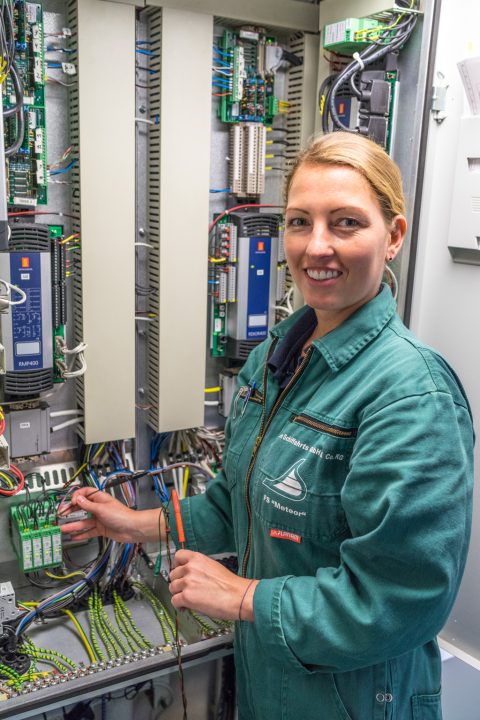Meet Cathi Hebold, the woman who works as an electronic engineer on the German research vessel METEOR.

Cathi Hebold. Photo from personal archive
What inspired you to pursue a career in marine sciences/technologies?
When working on my bachelor’s thesis, I found out that electronics engineers also worked on German research vessels. As my father and husband are also sailors, I had the possibility to visit their ships several times. Therefore I wished to experience work and life on a ship on my own. After the internships on two German research vessels for my bachelor’s thesis, I realized that the working conditions on a vessel completely matched my vision of working as an electronics engineer.
What are the main things you enjoy about being a marine engineer?
On board a vessel it is important to work together as a team and to collaborate with other departments, i.e. to be a complete unit and to support each other. Everybody talks to everybody directly, so that problems can be solved as fast as possible. As the vessel at sea can’t stop somewhere to buy something urgently needed or get a service support to fix problems, you need to be creative to find a solution to solve the problem on your own. A wide field of responsibilities on a research vessel makes the job particularly interesting. It starts in the mast with the antennas and ends with zinc diodes to prevent rust on the vessel’s own scientific devices, e.g. on the CTDs rosette.
What are your main professional achievements?
During my time on board I climbed a greasy pole and I can say I’m proud being 2nd Engineer now.
Did you have any role models that led you to this career? How did they influence you?
Not a female role model, as I didn’t know any female technicians in my surroundings. As I grew up in the times of the GDR, there was no question about gender equality. Women got the same technical education as men as early as at school and studied for technical jobs. I was even more influenced by my grandfather because I was constructing little things with him in his workshop. When I was a child, I was also impressed by the TV series character MacGyver, who could get out of precarious situations at the last minute by inventing gadgets only with a Swiss army knife and a bit of chewing gum. This is what is often needed on board, a so-called MacGyver strategy.
Have you ever had any difficulties in your career due to your gender? If yes, how did you handle them?
I never felt discriminated in any way. From the beginning, as well as during my internship, I was accepted and treated as an equal colleague.
Do you think there is a need for special girls’ support to study marine sciences/technologies?
It’s hard to say. I got to know some girls here who did their apprenticeship as sailors, and they were especially interested in the technical part, less in the work at the bridge. Maybe it’s a question of raising children and religion, whether the female role is limited to cooking, child care and cleaning, when she is not expected to be able to use a hammer to put a nail in the wall.
How could they be encouraged to pursue careers in marine sciences and technology?
As women are frequent users of social media, the interest could be aroused through such platforms, but the best way is always to discover things on your own. During the school years, girls should have the possibility to get in touch with the real work conditions, so that they could form their own opinion.
Do you think there is a need for special support to retain women in science? In what stages of their career?
At the very beginning, because the interest in science is to arouse curiosity: how things work, why the sky is blue… Curious girls can become scientists.
How can we overcome the issues of driving women out of careers in marine science and technology?
The big issue in a woman’s career is having a family and children. In many cases, the career ends with the birth of a child. That makes a reliable child care necessary, and especially a change in the opinion that powerful career women can’t be good mothers. Then it would be easier for many women to follow up a career.
What advice would you give any women considering science as a career path?
To choose the right type of study in a demanded branch that ensures a well-paid and secure job in the end.
What is the most effective way for you to maintain balance of your professional and personal life?
To have an understanding family and friends who withstand the long time I’m away from home. Try to have a free mind at leisure and concentrate on the issues during the worktime, which is not always possible. Don’t take any resentment to heart and accept decisions you’re getting from your supervisors, even if they do not seem logical, and your own logical arguments are ignored.
What are your professional and personal dreams?
My dream is to continue working on a vessel because it is the best model of life, even if it means much sacrifice, especially as regards the family and friends. As our crew is getting older and younger colleagues must follow, with my qualification and experiences I have got, I imagine becoming a department head.